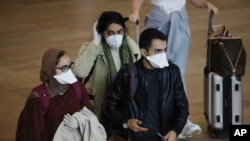Israel has imposed strict regulations for a two-week quarantine for all arriving Israelis and tourists because of the coronavirus outbreak. With the measures taking effect just before the Passover and Easter holidays, both Israelis and Palestinians are bracing for an economic hit. In the West Bank town of Bethlehem, Palestinians have declared a state of emergency and the normally bustling streets are empty.
Anybody landing in Israel will have to enter an immediate two-week quarantine as Israeli officials imposed strict new rules hoping to stop the spread of coronavirus. Tourists have until Thursday to leave the country and then they will have to prove they have a place where they can be quarantined.
As of Tuesday, 58 Israelis have been diagnosed with the coronavirus although the number is expected to rise. Dr. Arnon Afek, the director of the Sheba Medical Center - Israel's largest hospital - compares the Israeli government's measures to the drastic approach taken by China.
"So Israel is doing just the same. And when we look at what is happening in Italy and we still don’t know what will happen in the U.S., I think that what Israel has done is remarkable and I hope that it will at least delay the arrival of corona to our community," he said.
Last week, Israel announced that anyone arriving from several European countries including Italy, France and Switzerland would have to go into home quarantine. That would apply to an estimated 80,000 Israelis who either returned from abroad or had contact with someone with the virus. Among those infected, one man, a Palestinian bus driver from east Jerusalem, was in serious condition after catching it from Greek tourists who had been on his bus.
The new rules coincided with Israel’s lively holiday, Purim, which involves wearing costumes and drinking. Many large events and parades were canceled. They also come ahead what are normally busy shopping and tourist seasons leading up to Passover and Easter.
Two smaller Israeli charter airlines Arkia and Israir said they were suspending operations, and the national Airline El Al has begun laying off 1,000 workers. Tel Aviv's Ben Gurion airport has been almost empty and hundreds of flights have been canceled.
Economic fallout
Economists estimate the damage will be more than a billion dollars each month. Some health officials say the restrictions are likely to continue into the summer.
Prime Minister Benjamin Netanyahu said Israel is working hard to find new solutions to the crisis.
He said that Israel is trying to develop a home testing kit for Corona which will make it easier to limit the number of people in quarantine.
In Bethlehem, not far from Jerusalem, church bells tolled over an empty Manger Square, where Christians believe Jesus was born. The Palestinian Authority closed off the town last week after seven hotel workers were diagnosed with coronavirus. A group of American pilgrims, who were originally stuck in a hotel in the nearby West Bank town of Beit Jala, were allowed to leave after they all tested negative.
The Palestinian Authority announced that all schools and universities would be closed for the next 30 days. Tourists were turned away and sent back to Israel.
Concern is growing that coronavirus could reach the densely populated Gaza Strip. Under an Israeli blockade for years, health workers fear the Hamas-controlled enclave does not have enough medical facilities or proper sanitation to deal with the virus. On Tuesday, there were no cases reported in Gaza, but officials say they are watching the situation closely.






